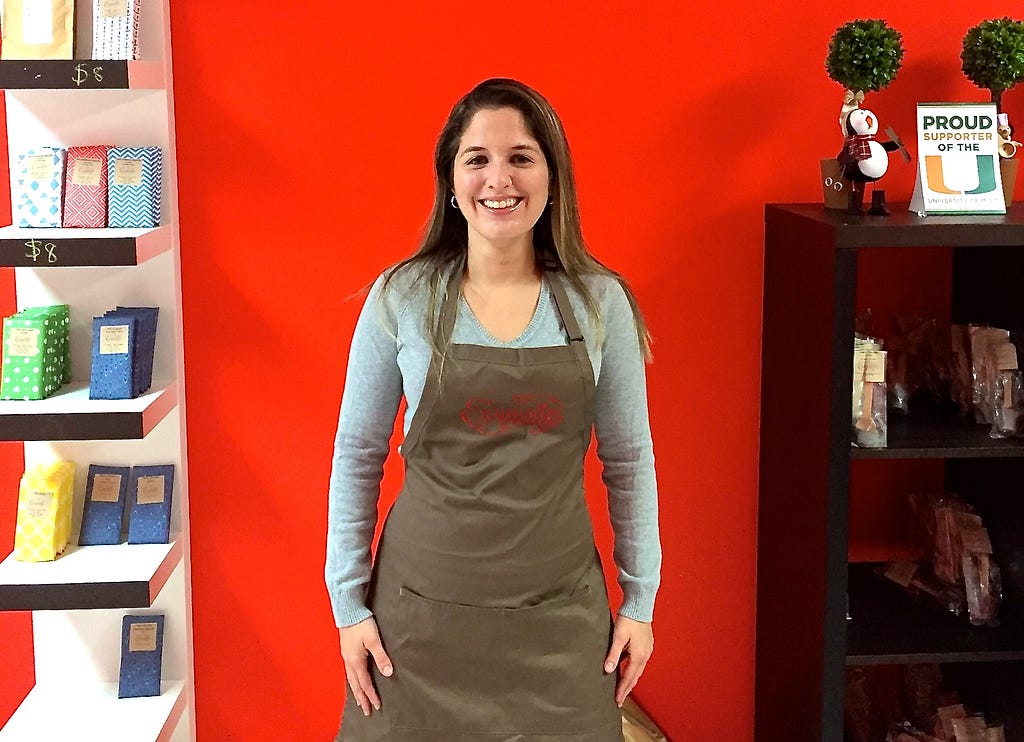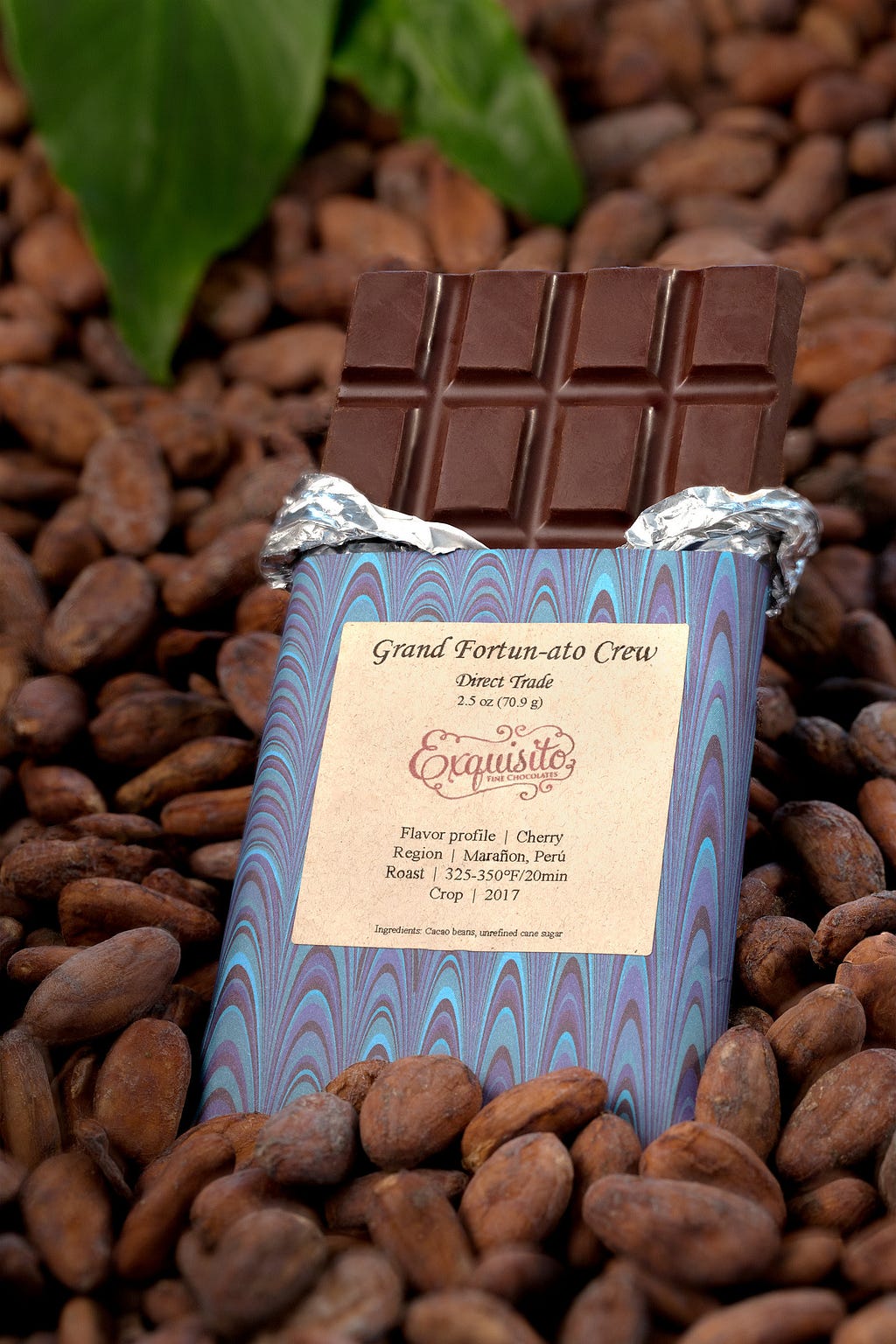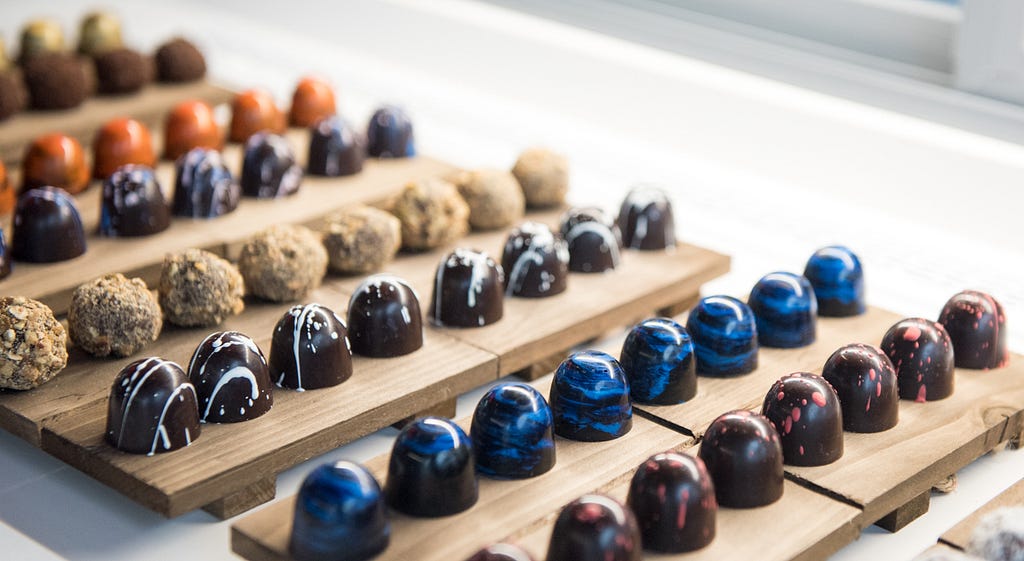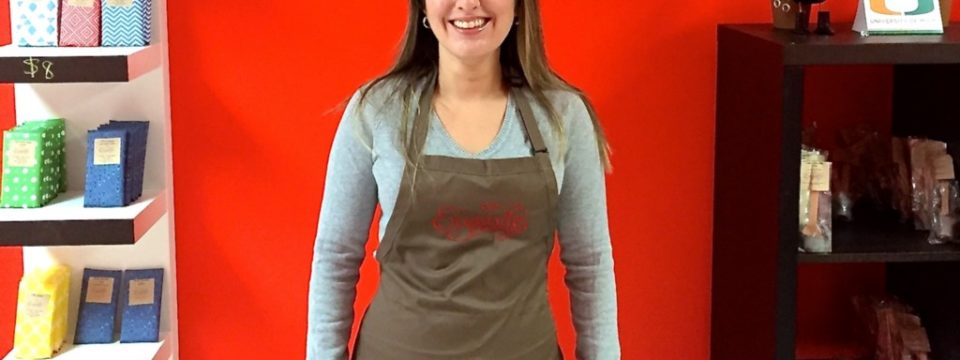Why it makes sense to befriend rather than compete with other founders in your industry, With Carolina Quijano

Make friends with other chefs in the industry. It’s been so key for me to connect with chefs not only for them to try and use my products, but also because they connect you to other chefs. The food industry is a very tight-knit one, and taking time to build relationships with other chefs has been crucial to my success. I connected with the chefs behind a popular wine bar in Miami, and after doing a chocolate and wine pairing event, they introduced me to a local ice cream maker, who is now using our chocolate in his ice cream.
I had the pleasure of interviewing Carolina Quijano, the founder of Miami’s first chocolate factory, Exquisito Chocolates, who turned her passion for chocolate into a business. After tasting European hot chocolate in Paris, she was hooked and tried to replicate it at home, prompting her to eventually take a leap and open a chocolate-making business. Now, after building a solid base with wholesale clients, supplying some of the city’s top chefs with pastry chocolate, she’s opened Miami’s first chocolate factory to educate the public about where chocolate comes from.
Thank you so much for doing this with us! What inspired you to become a chef (or restauranteur)?
It all started in Paris back in 2011. While traveling on business, I discovered truly delicious hot chocolate in Montmartre. I tried to find a similar product in the States, to no avail. So I spent the next year and a half experimenting with chocolate to try and replicate it on my own, while still working at a corporate job. Finally, I took the leap and decided to quit my Madison Avenue job, and moved to Miami to open a chocolate-making business.
What has your journey been like since first stepping foot in a kitchen?
It’s been an adventure. I took a couple chocolate classes purely out of interest but have no professional culinary background, so I’ve learned pretty much everything on the job. I also learned quickly that there are basically no chocolate-making machines if you’re not a large company like Hershey’s — they simply don’t exist, so I’ve had to re-engineer other machines (for example, a champion juicer cobbled together with a Shop-Vac to separate the shell from the nib of the cacao bean).
Do you have a specialty? If so, what drew you to that type of food?
Chocolate! My experience in Montmarte definitely brought chocolate to the forefront, but chocolate has always been a happy food for me, associated with childhood and good memories.
Can you share the funniest or most interesting story that happened to you since you became a chef?
We’ve participated in the South Beach Wine and Food Festival the past several years, and try to connect with some of the visiting chefs while they’re in town. One year, Joanne Chang of Flour Bakery + Café in Boston was hosting an event, and we reached out to see if she wanted to visit the factory. To our pleasant surprise, she said yes! The schedule for visiting chefs is often so packed, but she found a pocket of time in her schedule before an evening event.
We sent our quality control / PR person to pick her up, since she was staying at the tony Fontainebleau hotel on Miami Beach, and the factory at the time was in a warehouse in West Kendall about 17 miles away. She drove Joanne and her team through the craziness of Miami highways, at one point having to slam on her brakes suddenly and pray she wasn’t going to cause the James Beard award-winning chef to be in a car accident.
Luckily, we got there in one piece, and Joanne loved the factory tour. We had to deal with a bit of Miami craziness again driving back, but thankfully there were no car accidents. Otherwise we know we’d definitely never be invited back to the festival — and we joked that’s how we don’t want to end up in the media!
What is your definition of success?
Being able to help cacao farmers achieve financial stability. I’ve established a direct trade model with farmers where I’m paying them often double or quadruple market value, and the impact I’ve seen it have on them where they’re able to keep farming, to send their kids to college, etc. is success to me.
What failures have you had along the way? How have they led you to success?
I attended pretty much every food-related event in Miami for the first year or so in business to get my name out there. Some of the events were failures in that sales were low or people didn’t understand the product, so I looked at an event as more of a success if I made a connection with someone else in the food industry there. One event we had our table basically sinking into the mud after a torrential downpour the day before, and the craft beer company at the table next to us took pity on us and helped us out of the mud. We bonded over that experience, and they’re now using our chocolate in two of their beers and a great local partner.

Are you working on any new or exciting projects now?
We just started sourcing cacao beans from Mexico, which is really exciting for me as it’s widely regarded as the birthplace of chocolate. We also have been working with a co-op in Haiti that’s just starting to grow cacao, and we’ve been advising them from the knowledge we’ve gained on how to properly grow and harvest cacao. It’s a really exciting project for us to be a part of and help bring some economic prosperity to the area.
What advice do you have for aspiring chefs?
Be eager to learn. I’ve learned so much from others in this industry and have been lucky to work with some amazing chefs who think of chocolate pairings that I haven’t even imagined.
What is the key to creating the perfect dish?
Start with good ingredients. With chocolate, when you make your own chocolate, you can’t hide behind poor flavors. If you start with low-quality cacao, you’ll end up with a low-quality chocolate, and I think the same can be said for other dishes.
It is said that food is a common ground that brings people together. As someone who makes food for a living, what does this saying mean to you?
Chocolate is very much a common-ground food that brings people together. I tell people just like how there is a wine or coffee for everyone, there is a chocolate for everyone. Some people like fruity chocolate, some people like spicy chocolate, but they can all enjoy chocolate together.
What are your “5 Things I Wish Someone Told Me Before I Became a Chef” and why? (Please share a story or example for each.)
Start out with a smaller menu. I started out with an extensive menu and then had to cut products as I realized what people liked and didn’t like. It’s a lot easier to start with a smaller menu and test out what works first.
Building out a foodservice space is expensive. I’m glad that I started with a wholesale model rather than opening a retail space first, as construction is a costly and lengthy process, and wholesale clients kept the cash flow going during that time.
Chocolate has a lot of the issues that are present in the diamond world — child labor issues, exploitation of farms, etc. A lot of the farmers aren’t paid a fair wage, and one of the first things we realized when budgeting was paying farmers a fair price for their product helped ensure quality cacao. We got a shipment one day from a farm that was filled with “trinkets” because it’s based on volume, so the farmers filled it with rocks, twigs, whatever they could find. When you make your own chocolate, you can’t hide behind poor flavors. If you start with low-quality cacao, you’ll end up with a low-quality chocolate.
Make friends with other chefs in the industry. It’s been so key for me to connect with chefs not only for them to try and use my products, but also because they connect you to other chefs. The food industry is a very tight-knit one, and taking time to build relationships with other chefs has been crucial to my success. I connected with the chefs behind a popular wine bar in Miami, and after doing a chocolate and wine pairing event, they introduced me to a local ice cream maker, who is now using our chocolate in his ice cream.
On a similar note, make friends with the media. I didn’t know about the value of PR when I first started in the industry. It wasn’t until The Miami Herald did a write-up on us and our chocolate factory opening that we really saw the power of PR in action, as numerous people came in after that saying they read about us in the newspaper. I’ve made an effort to cultivate relationships with local media, and we’ve been very lucky to get some great coverage of us and what we’re doing.
You are a person of great influence. If you could inspire a movement that would bring the most amount of good to the most amount of people, what would that be? You never know what your idea can trigger.

Bringing chocolate in the footsteps of craft coffee and craft beer, where people are learning where exactly those products come from and how they’re being made. People love chocolate, but have very little knowledge about where it comes from, and we’d love to see a movement inspired where people take an active part in knowing where chocolate comes from and the value of high-quality chocolate to support cacao farms.
Some of the biggest names in Business, VC funding, Sports, and Entertainment read this column. Is there a person in the world, or in the US with whom you would love to cook for and why?
Chrissy Teigen! I think she’d have a lot of fun learning how chocolate is made and making her own chocolates. I love that she’s all about cooking food people actually want to eat, and who doesn’t love eating chocolate?
Why it makes sense to befriend rather than compete with other founders in your industry was originally published in Authority Magazine on Medium, where people are continuing the conversation by highlighting and responding to this story.
